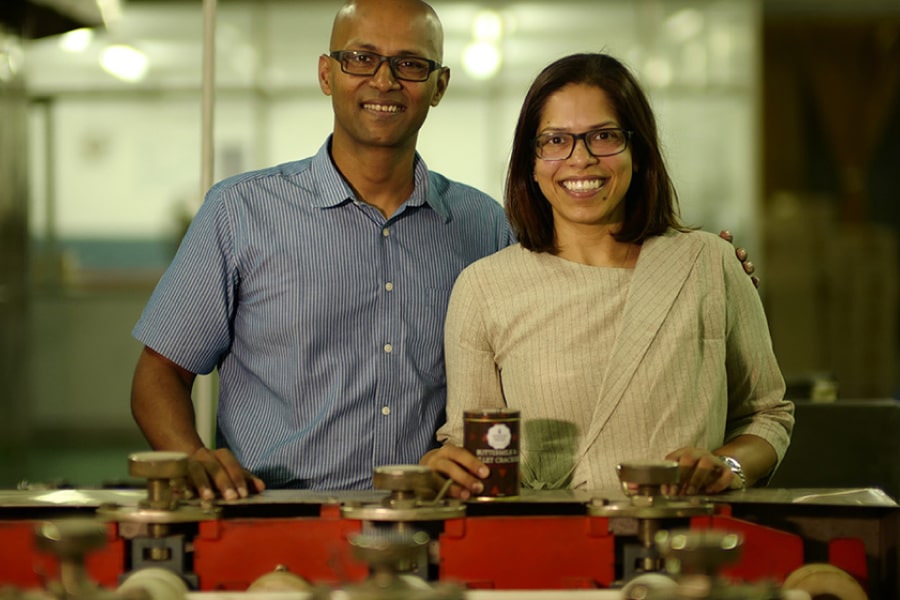We want our healthy products to be made in India but have a global appeal
Uma Machani & Srivardhan Sethuram, founders, Monsoon Harvest, talk about the different dietary trends that have evolved over the years & how their products have kept up with these ever-evolving fads. They add that Indian snacking was limited to local kirana shops and that is now slowly evolving with much larger players in the traditional Indian snacks market as well. The healthy snacking is still a very small portion of it and that will grow as well, but snaking is going to remain a part of our culture.

IBT: When and how did your company embark on its export journey? How has your international presence evolved over this period, and what are your key products and markets?
Uma Machani & Srivardhan Sethuram: The journey of Monsoon Harvest range of products goes back to 2016. Initially, these products were sold only in the domestic market, with products being offered only in Bangalore. Gradually, these products found their way across markets in other Indian cities like Delhi, Mumbai & Kolkata.
As the popularity of these products started soaring in India, the company also started getting a lot of queries regarding availability of products abroad. Prospective international distributors reached out to see if they could distribute these products in their local markets. Two years ago, Singapore became the first country that we exported to, though these products are only available in a select stores. Last year, we also started shipping our products to the Maldives and Dubai, where our products are getting a warm response. Now, we’re also exporting our products to Oman. The company is also exploring the idea of expanding our presence in the GCC & Asia, and establishing our presence in the markets of Australia, the US and Canada through Amazon.
IBT: What are your key target audiences in these markets? Have some products managed to gain traction among the native populations of these countries? Please elaborate.
Uma Machani & Srivardhan Sethuram: The products offered by Monsoon Harvest are made in India using Indian ingredients, but they have a global appeal. While our customers abroad may not necessarily be aware of traditional Indian ingredients that we use, the flavor palettes we use are very international.
As far as the marketing strategies are concerned, they depend from market to market. For example, Singapore, our products are sold in a store called Scoops which is a store where people are trying to minimize plastic packaging. Customers visiting that store literally see the product and scoop out the quantity that they need. But in Oman, our products are sold in regular grocery stores. The Indian diaspora as well as the natives of that region buy these products with zeal.
IBT: What are the major transformative trends that you have seen in the F&B retail space in the post-COVID context, in terms of customer perceptions, habits and product preferences?
Uma Machani & Srivardhan Sethuram: Customers these days have become a lot more careful wrt what they’re looking for and how they’re purchasing. In terms of what customers are looking for, people are a lot more health conscious & there was a rise in product offering with essential nutrients, immunity boosters, turmeric, pepper, anything that has a health and wellness angle to it. As far as the purchasing sources are concerned, there was a huge growth in the e-commerce purchasing cycle. So, a lot of brands started selling their products , across the board from Amazon, Flipkart, BigBasket, Grofers, & even Swiggy.
IBT: How do you see the healthy snacking trend across the international market over the past few years? What factors are driving this trend, and how has COVID-19 played a role?
Uma Machani & Srivardhan Sethuram: Over the last few years, there has been a general awareness among the population about how to start eating healthy. There are so many so many different trends going around from fasting, high protein diets, veganism & so forth. There was a very high protein boom in India over the last three, four years as people would prefer the high protein food to cut their carbohydrate intake. There was a lot of high protein bars, a whole bunch of different things. But now you see a lot more vegan products. Products began to be made using coconut milk, almond milk & soya milk. Then, people started replacing white sugar with healthier alternatives like honey, palm sugar, jaggery & stevia. At the same time, the amount of sugar used to make products was also brought down. Similarly, white rice began to be replaced by brown rice and quinoa.
With the blossoming of the start-up culture, a lot of people were able to easily and quickly bring a lot of healthy products and give customers a range of options. For example, the breakfast/healthy snacking segment itself has a plethora of options for the customers to choose from. Further, influencers on social media also disseminate awareness about these products. And thanks to the rise in the popularity of e-commerce over the years, brands easily make themselves available to the customer. This easy access made it easy for different brands to make products specific for different people. So, there was a rising awareness and product availability happening simultaneously and people were starting to eat healthy. And then post-pandemic, this transition just got accelerated.
IBT: What are the new product trends that seem promising from your perspective in the global market?
Uma Machani & Srivardhan Sethuram: In the global market, especially in Europe, there is a lot of focus on organic & vegan products, with a lot of collagen being used. In Asia, too, people are demanding fresh, organic food. In the USA, there is a great demand for snaking bars, healthy bars, protein bars & protein shakes. Customers across the globe are also moving towards products with zero added sugar & products with less artificial ingredients in them. In terms of protein, there is a shift from soy protein to pea-protein. There’s always a new fad.
IBT: What launches are you planning in the coming months to serve the needs of the market?
Uma Machani & Srivardhan Sethuram: We are planning to launch some products, but not in these particular themes. But these will be in the healthy snaking and breakfast space. We want to grow our product availability, give customers more choice – high protein, high fiber, no added sugar, palm sugar, coconut sugar. At the end of the day, the product has to be healthy & tasty.
IBT: What changes have you made to your brand promotion and distribution strategy in the post-pandemic period?
Uma Machani & Srivardhan Sethuram: Monsoon Harvest started off by being mostly a retail brand, but thanks to the pandemic, we have expanded our virtual presence. During the lockdown, our distributors across the country suffered a lot because they were not able to supply to stores and they were not able to collect payment from stores. During the lockdown, we shifted our focus from retail promotions in food stores & tastings to more online promotions.
IBT: How do you see the Indian snack food industry evolving over the next five years? Which demographics will drive growth and what changes in buyer habits are you anticipating?
Uma Machani & Srivardhan Sethuram: Indians are the greatest snackers in the world. We love our snacks and healthy snacking is actually a very very small portion of the Indian snacking industry. Traditionally, Indian snacking was limited to local kirana shop and that is now slowly evolving with much larger players in the traditional Indian snacks as well. The healthy snacking is still a very small portion of it and that will grow as well, but snaking is going to remain a part of our culture. So, the size of the Indian snacking market will continue to grow.
Umeshwari (Uma) Machani & Srivardhan Sethuram started Monsoon Harvest in 2016. Prior to this, Uma had a background in economic development and Srivardhan’s background was in engineering and marketing. They both were, however, very passionate about both, food and the environment & came up with the idea of using millets in new and contemporary ways as millets have a smaller eco footprint than most other grains such as wheat and rice and are a highly sustainable crop.













Pls visit http://www.udayaagro.com
We innovated high fibre high resistant starch high protein low GI rice in its white form itself and got patent granted
.